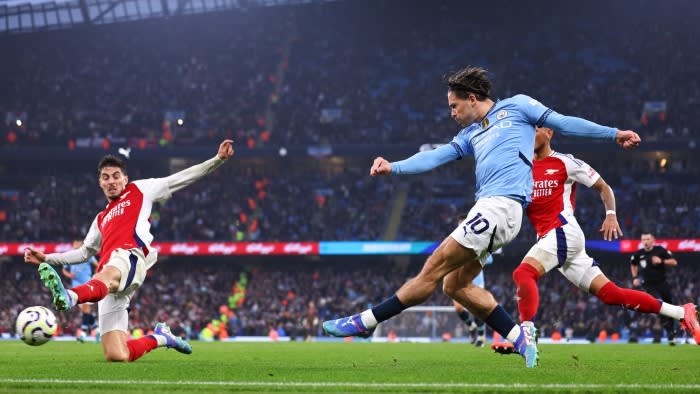Unlock the Editor’s Digest for free
Roula Khalaf, Editor of the FT, selects her favourite stories in this weekly newsletter.
The Premier League’s rules on commercial agreements between football club owners and related companies are unlawful, a tribunal has found, following a legal challenge from Manchester City that will force some of the regulations to be rewritten.
City, which is owned by a member of the Abu Dhabi ruling family, challenged the league’s so-called Associated Party Transaction rules earlier this year, claiming that they had unfairly blocked sponsorship deals, including one with Abu Dhabi-based airline Etihad.
The Premier League’s APT rules were brought in after Newcastle United was acquired by Saudi Arabia’s Public Investment Fund in late 2021, and updated again earlier this year.
The regulations were designed to prevent companies related to club owners from using inflated sponsorship deals to boost revenue and so give teams greater leeway to spend on players.
Although an independent panel rejected several of City’s claims, and recognised the Premier League’s need for an assessment mechanism for related party deals, it deemed the current rules “unlawful” under UK competition law.
This was principally because the rules excluded shareholder loans from their assessment. Several Premier League clubs rely on interest-free loans from their owners but — unlike sponsorship deals — loans are not required to meet “fair market value” criteria.
The tribunal also found that the way APTs are assessed was unlawful on a procedural basis, with clubs denied important information before decisions were made.
The ruling means the Premier League’s original assessment of two City sponsorship deals, including the Etihad deal in question, no longer stand. Etihad is already the club’s front of shirt sponsor and has naming rights over its stadium.
The Premier League said that a “small number of discrete elements” in its rule book would now need updating, but that the changes could be done “quickly and effectively”.
City’s partial victory on the APT rules comes as a separate independent committee hears the case brought by the Premier League against the club related to 115 alleged financial rule breaches stretching over many years. A verdict in that case is expected in the new year.
After being acquired by Sheikh Mansour bin Zayed Al Nahyan in 2008, City has become the dominant force in English football. The club has won the Premier League six times in the past seven years, and last year won the Uefa Champions League for the first time.
Monday’s ruling is the latest in a string of legal challenges against football’s rulemakers.
On Friday, the European Court of Justice said the current rules set by global governing body Fifa regarding football transfers were unlawful, while the same court ruled late last year that Fifa and its European counterpart Uefa had breached competition law during their response to the aborted European Super League.
City’s battle against the league is another example of how football clubs are increasingly taking the legal route to determine the rules that underpin the competition. It is a recognition of how the rules off the pitch — not just star players — can influence winners and losers on the pitch.
The Premier League said the verdict “endorsed the overall objectives, framework and decision-making of the APT system”. The league said it would now add shareholder loans to its assessments and remove some of the amendments brought in earlier this year.
“The tribunal upheld the need for the APT system as a whole and rejected the majority of Manchester City’s challenges. Moreover, the tribunal found that the rules are necessary in order for the League’s financial controls to be effective,” it added.
City said it welcomed the findings of the tribunal. “The club has succeeded with its claim: the Associated Party Transaction rules have been found to be unlawful and the Premier League’s decisions on two specific MCFC sponsorship transactions have been set aside,” it said.


